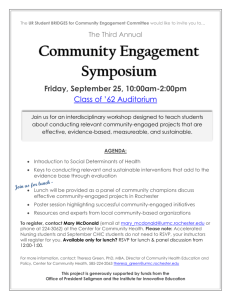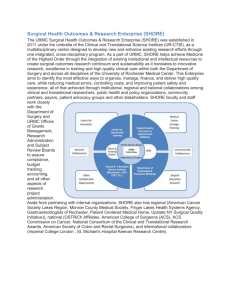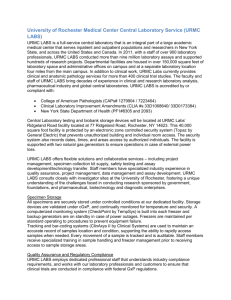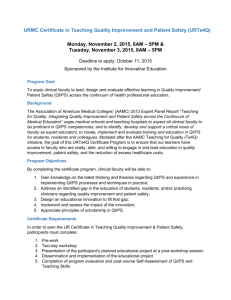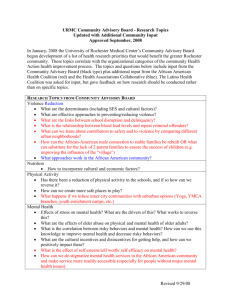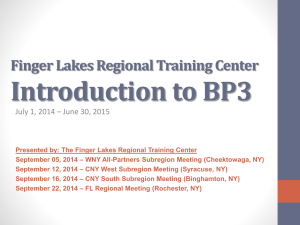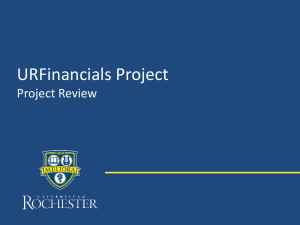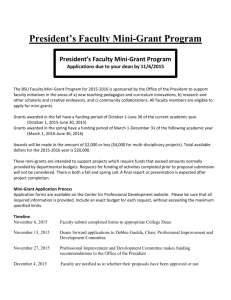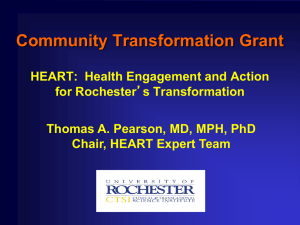Mini-grants
advertisement
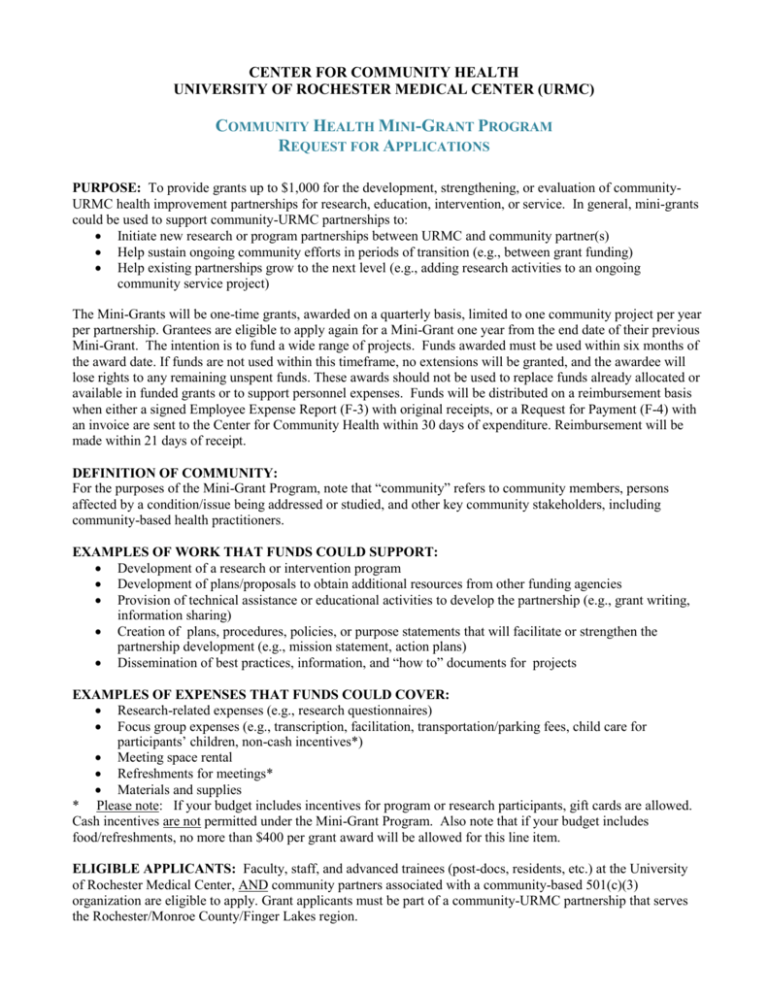
CENTER FOR COMMUNITY HEALTH UNIVERSITY OF ROCHESTER MEDICAL CENTER (URMC) COMMUNITY HEALTH MINI-GRANT PROGRAM REQUEST FOR APPLICATIONS PURPOSE: To provide grants up to $1,000 for the development, strengthening, or evaluation of communityURMC health improvement partnerships for research, education, intervention, or service. In general, mini-grants could be used to support community-URMC partnerships to: Initiate new research or program partnerships between URMC and community partner(s) Help sustain ongoing community efforts in periods of transition (e.g., between grant funding) Help existing partnerships grow to the next level (e.g., adding research activities to an ongoing community service project) The Mini-Grants will be one-time grants, awarded on a quarterly basis, limited to one community project per year per partnership. Grantees are eligible to apply again for a Mini-Grant one year from the end date of their previous Mini-Grant. The intention is to fund a wide range of projects. Funds awarded must be used within six months of the award date. If funds are not used within this timeframe, no extensions will be granted, and the awardee will lose rights to any remaining unspent funds. These awards should not be used to replace funds already allocated or available in funded grants or to support personnel expenses. Funds will be distributed on a reimbursement basis when either a signed Employee Expense Report (F-3) with original receipts, or a Request for Payment (F-4) with an invoice are sent to the Center for Community Health within 30 days of expenditure. Reimbursement will be made within 21 days of receipt. DEFINITION OF COMMUNITY: For the purposes of the Mini-Grant Program, note that “community” refers to community members, persons affected by a condition/issue being addressed or studied, and other key community stakeholders, including community-based health practitioners. EXAMPLES OF WORK THAT FUNDS COULD SUPPORT: Development of a research or intervention program Development of plans/proposals to obtain additional resources from other funding agencies Provision of technical assistance or educational activities to develop the partnership (e.g., grant writing, information sharing) Creation of plans, procedures, policies, or purpose statements that will facilitate or strengthen the partnership development (e.g., mission statement, action plans) Dissemination of best practices, information, and “how to” documents for projects EXAMPLES OF EXPENSES THAT FUNDS COULD COVER: Research-related expenses (e.g., research questionnaires) Focus group expenses (e.g., transcription, facilitation, transportation/parking fees, child care for participants’ children, non-cash incentives*) Meeting space rental Refreshments for meetings* Materials and supplies * Please note: If your budget includes incentives for program or research participants, gift cards are allowed. Cash incentives are not permitted under the Mini-Grant Program. Also note that if your budget includes food/refreshments, no more than $400 per grant award will be allowed for this line item. ELIGIBLE APPLICANTS: Faculty, staff, and advanced trainees (post-docs, residents, etc.) at the University of Rochester Medical Center, AND community partners associated with a community-based 501(c)(3) organization are eligible to apply. Grant applicants must be part of a community-URMC partnership that serves the Rochester/Monroe County/Finger Lakes region. APPLICATION INSTRUCTIONS All applications must be complete and should be submitted to Mary McDonald by email (Mary_McDonald@urmc.rochester.edu ). This is the preferred method of submission. If email is not possible, applications may also be submitted by interdepartmental mail to Box 614, or by first class mail to Mary McDonald, Center for Community Health, 46 Prince Street, Suite 1001, Rochester, NY 14607. Applications must be accompanied by two (2) letters or e-mails of support, as follows: URMC applications from staff: Letters or e-mails should be provided by the Program Director and the lead community agency URMC applications from faculty/advanced trainees: Letters or e-mails should be provided by the Department Chair and the lead community agency Community Partner applications from agency: Letters or e-mails should be provided by the agency Director and by URMC partner Program Director or Department Chair (see guidelines above) Application Page Limit: A total of three pages, including a two-page, single-spaced narrative and cover sheet using Times New Roman 12 point font or comparable font size. Applications should indicate a specific timeframe in which the funds will be used (within six months of award date) even if the project is ongoing. Applications are accepted on a quarterly basis by noon on the following dates: February 10, May 10, August 10, November 10) Estimated time for review of submitted applications is three weeks. Funding announcements will ordinarily be made within four to five weeks following the application submission deadline. All sections of the application need to be completed thoroughly. Incomplete applications will result in a delay. Applicants who have submitted incomplete applications will be invited to make revisions and resubmit applications for review in the next quarterly funding cycle. If you have any content questions regarding the Community Health Mini-Grant Program, please contact Gail Newton at gail_newton@urmc.rochester.edu or (585)224-3057. For process questions, please contact Mary_McDonald@urmc.rochester.edu or (585)224-3062. GRANT REVIEW PROCESS A Review Committee comprised of three members, including two URMC faculty or staff and one member from the community, will review each application. Reviewers will complete a rating sheet for each application that includes both a numeric rating and comment section. Funding decisions are made based on the rating sheets and availability of funding. Applications are judged on the following criteria: How project activities will contribute to the community-URMC partnership If project activities are consistent with the purpose of the Mini-Grant program If project activities support the achievement of the project’s purpose If the budget is complete and reasonable to meet the goals of the project and within funding guidelines If the project activities support and contribute to the partnership’s long term goals If all of the community-URMC partners are clearly identified related to the project. In addition to notifying applicants who are awarded funding, letters will be sent to applicants who are not funded, which will include suggestions by the reviewers to help strengthen applications in the future. CENTER FOR COMMUNITY HEALTH COMMUNITY HEALTH MINI-GRANT APPLICATION FORM Name of Applicant: Title/Position: URMC Department or Community Agency Name: Name of Project: Amount Requested: Project Dates: Is Your Agency a 501(c)(3) (for community applicants only): _____yes _____no Dates Funds will be Used: If awarded a grant, I will allow my project to be posted on the Center for Community Health Website __________ yes ___________no Name of Department Chair (for URMC Faculty/Advanced Trainee Applicants): Name of Program Director (for URMC Staff Applicants): Name of Agency Director (for Community Applicants): List all Community/URMC partners and contact information (email addresses and phone numbers): Grant Project Objectives: Overall /long term goal of the community-URMC partnership: Partnership Relationship Description: Briefly explain the roles and responsibilities of all partners and the frequency and type of contact among the partners. Include how this grant might further promote/strengthen the community-URMC partnership for the future. Grant Activities Description: List the specific activities to be supported by this mini-grant, and the rationale for how it will contribute to the community-URMC partnership goals and objectives. Outcomes: Describe the result to stem from this partnership effort. What are the anticipated outcomes of the grant’s activities, and how will you measure success? Guiding Principles for Community-Engaged Research (for URMC applicants only): The attached list of Guiding Principles has been developed by the URMC Community Advisory Council. These principles also apply to non-research projects. Briefly explain how these principles are incorporated into this project and how you think this will contribute to the sustainability of the partnership and success of the project. Budget: Provide a brief budget narrative and itemized budget. The budget itself can be a separate page. UNIVERSITY OF ROCHESTER MEDICAL CENTER (URMC) COMMUNITY ADVISORY BOARD GUIDING PRINCIPLES FOR COMMUNITY-ENGAGED RESEARCH APPROVED SEPTEMBER, 2008 Long-Term engagement Research investigators work through existing partnerships in the community when such partnerships exist. The level of partnership corresponds to each project’s level of community interaction and impact. Mutual benefit Increased knowledge improves the health of the community and benefits both the community and the researchers/URMC. Mutual respect Researchers and community members work together with humility, candor and mutual respect for expertise and cultural differences. Shared findings Research findings are shared with community partners and stakeholders. Enhanced community capacity Members of the “target community” for the research project are hired and trained where possible and appropriate, to help build and enhance community assets. Shared responsibility All partners (URMC and community partners) have obligations towards the project and the community. Evidence-based The best available evidence guides research relationships between URMC and the community, and best efforts are made to evaluate each project. Collaborative from start to finish* There is a collaborative and equitable engagement of all partners in all key phases of the research including identification of target population research objectives, project organization interpretation of data Responsive to community priorities and perspectives* Community-Based Participatory Research addresses health needs, interests and priorities established by the community. Health is addressed from both individual and ecological perspectives – (i.e. considering social, economic, cultural, and policy contexts). *These guidelines apply specifically to Community-Based Participatory Research.
